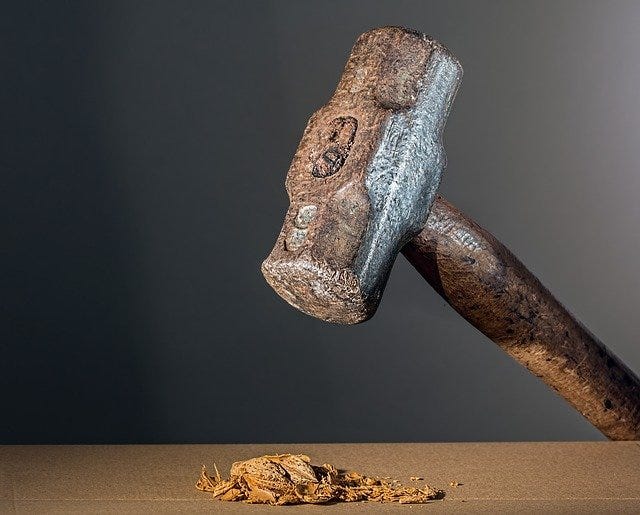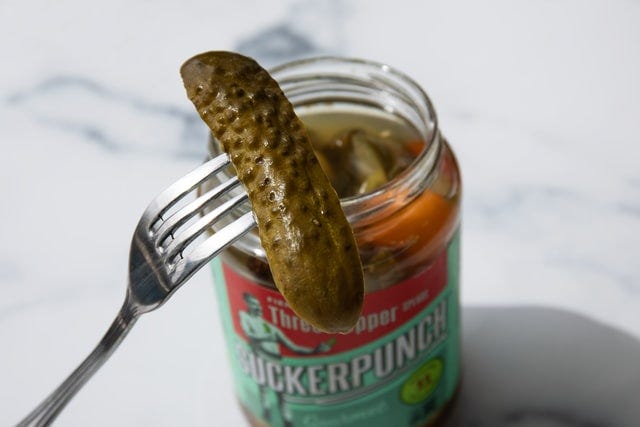Winning English - Mastering Idioms, Slang, and Cultural References
Phrases for success and difficulties • Above and beyond • Go the extra mile • Crushing it • Kicking ass • In a pickle • Between a rock and a hard place • Damned if you do, damned if you don't
Hello, everyone! Today I have a selection of sayings and phrases for when people are succeeding and for when they are struggling to succeed.
Interested in a podcast version of Winning English? Check out my site on Podbean or find it in your favorite listening app.
Doing well and succeeding - and a warning about one crude example
We all love it when we are doing very well, succeeding at tasks, and accomplishing goals. So, it’s not too surprising that there are many sayings for that in English. Here are a few.
When someone wants to compliment you for doing very well at something, he or she might say that you are going above and beyond. “To go above and beyond” means that you are doing far better than you were expected to or doing far more than you were expected to. You can use this phrase at work, for example, to say an employee went above and beyond their expected duties. You can also use this to thank a friend for helping you. You might say, “Wow, you went above and beyond when you brought groceries to me when I was sick.”
I’ve also written about a similar phrase before, which is to go the extra mile. You might want to review that one. It’s used in much the same way.
Now, perhaps you are doing something that requires you to perform in front of other people. It could be a business presentation or even a sport. If you are doing really, really well that day, a friend might tell you, “Wow, you are really crushing it!”

You might be thinking that “crushing it” would be bad. It’s true that, normally, when something is crushed, it is squashed down and destroyed. That’s bad. But used this way, it’s good! It’s as if you are crushing all of the bad things that could ruin your performance, letting you do better and better.
I’ve written before about a similar phrase - nailed it - which you might want to review. Again, it’s used in much the same way.
Now, suppose you are doing very well and - this is important - you are with friends or people you are comfortable with. There is an impolite, crude way for them to compliment you. Your friends might tell you that you are kicking ass! Let me repeat - this is impolite speech. Do not use this in formal settings. Like “crushing it”, you might think “kicking ass” is bad, but here, it’s good.
However, be careful with the wording of this phrase. You don’t want to have your ass kicked. And you don’t want someone to kick your ass. Those are both bad. They mean you are being defeated and not succeeding. You most certainly want to be the person kicking ass!
Are you enjoying Winning English? I hope so! If you are, please consider donating to this service through Patreon. Any amount would help. I count on support directly from readers like you. Thanks! 🙏🏻
When you are struggling to succeed
We can’t be crushing it or kicking ass all the time. Sometimes things are not so easy for us. Often we have to choose among only bad options. English has phrases for those times, too!
Let’s start with a funny sounding one - to be caught in a pickle. A pickle is a kind of food made out of a small cucumber.

How does one end up inside a vegetable? Well, my understanding is that, in the past, “a pickle” used to be a sauce made up of a mix of vegetables, so I can see how someone could be in a bowl of that sauce. Anyway, the meaning today has evolved so that to be “in a pickle” means that you are in a situation where you have no good choices. You have to pick the least worst option.
Believe it or not, this is a common saying. Recently the news service CNN had this headline:
Another saying with a similar meaning is caught between a rock and a hard place. This saying also means that you only have bad options to choose from. This is probably easy to understand. A rock is hard and uncomfortable, and so is a hard place. If you’re between them, you have no good choices.
A final, similar example is damned if you do, damned if you don’t. Damned is a verb that has many meanings today, but it originally came from religion. If you were damned, you were sent to hell or some other bad place for doing bad things. Now, regarding the saying, “damned if you do, damned if you don’t”, you face a choice of whether to act in a certain situation or whether to do nothing at all. However, both acting and not acting lead to bad outcomes. You’re metaphorically going to hell, either way. People will often say this when they know they’re in an impossible situation. “Well, I guess I’m damned if I do, damned if I don’t”.
Anniversaries and their related materials and (very confusing) words
If you can believe it, this is my 75th post of Winning English!
It’s common to recognize every 25th version of something, of course. For example, we often celebrate 25th and 50th wedding anniversaries. What you might not know is that many anniversaries traditionally also have materials associated with them.
It’s not clear how this tradition got started. But a 25th anniversary is called a silver anniversary, and it’s common to give gifts of silver to celebrate. A 50th anniversary is called a golden anniversary, and it’s common to give gifts made of gold.
There are many more connections between anniversaries and certain materials, too.

A first anniversary is often associated with paper - at least in the United States. A sixth anniversary is often associated with iron. A 19th anniversary is associated with jade. And a 60th anniversary is often associated with diamond.
If you want to find out more about these traditional connections, here are a couple of useful links.
By the way, there are also special words derived from Latin to describe many of these anniversaries.
For example, a decennial anniversary is a 10th anniversary. A 35th anniversary is a quintricennial anniversary. There’s even one for 75th. Using that word, this is the semisesquicentennial post of Winning English!
Seriously, these words are hardly ever used, so don’t worry about learning them. Just consider them fun - and somewhat ridiculous - English vocabulary words to learn. That’s how most native speakers think of them!
Thanks, please share, and please consider donating
Thanks for being part of Winning English! I hope you enjoy it. If you do, please like, comment, and share this post.
Also make sure to follow Winning English on Facebook, LinkedIn, or Instagram.
If you really like Winning English, please do me favor - tell a friend about it. I’m trying to grow this service, and you can really help me out.
If you really, really like Winning English and want to go a step further, please consider donating through my Patreon page. I offer this free of charge, so I rely directly on support from readers like you. Thanks, and talk soon!
Bill
Writer & host



